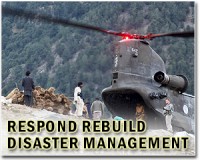| . |  |
. |
Santiago, Chile (UPI) Jan 28, 2011 Many Chileans are poorer in the aftermath of last year's 8.8-magnitude earthquake that devastated housing, wiped away jobs and damaged economic infrastructure, an official survey found. The findings of a Post-Earthquake Survey contrasted with optimism of an International Monetary Fund report in September, which praised what it called Chile's rapid recovery in the aftermath of the temblor on Feb. 27, 2010. At least half a million people, many left without jobs, have fallen into the poverty trap, the survey found. Chilean Planning Minister Felipe Kast and Housing Minister Magdalena Matte jointly announced the results of the survey, which gives the most detailed findings on the social impact of the quake, aggravating poverty, undermining property ownership and increasing incidence of psychological stress and mental disease. The survey found that Chile's poverty ratio rose from 16.4 percent of the population in 2009 to 19.4 percent in 2010 mainly as a result of extensive job losses in the central and southern regions, where quake damage was extensive and losses to business and industry widespread. "These figures show that Chileans lived through a real social tsunami," Kast told reporters. "We have discovered that 500,000 Chileans have fallen into poverty." At the end of 2009, 2.7 million Chileans were living in poverty but after the quake the figure rose to 3.2 million. Poverty among Chile's non-European communities of indigenous Indian origin rose from 3.8 percent -- about 630,000 people -- to 4.2 percent or about 700,000 people. The survey based its findings on results from 22,000 homes to make its estimates, The Santiago Times said. Government officials and economists said the survey figures could have changed since the investigations began in May 2010. More optimistic among observers said the last few months had witnessed job creation at a faster rate, which could affect the rising percentages of poor reported in the survey. However, analysts said the figures were conservative and poverty rates may be higher as a result of underemployment. U.N. estimates cited by the newspaper said Chile's earthquake and subsequent tsunami cost $30 billion in damages and was the costliest natural disaster globally in 2010. Haiti's earthquake, which caused 222,500 deaths, was the year's worst natural disaster. Economists remain upbeat about Chile's chances of a hefty rebound. An IMF report said Chile's economy is expected to recover strongly in 2010-11, driven by reconstruction spending and a rebuilding of inventories. The IMF, in its regular annual assessment, said the country's economy showed remarkable resilience since the 2008 downturn. The economic recovery is fully under way, helped by appropriate policy responses to the two large adverse shocks -- the earthquake and the recession, the report said. The IMF said the Chilean economy will grow 5 percent in 2010 and 6 percent in 2011. "Strong private consumption and large public and private investment, including on inventories, are expected to sustain domestic demand growth," the report said. To create the incentives for faster growth in productivity, the government is planning reforms aimed at increasing competition, facilitating the entry of new firms, making credit more accessible to small and medium-enterprises and improving bankruptcy regulations.
Share This Article With Planet Earth
Related Links Bringing Order To A World Of Disasters A world of storm and tempest When the Earth Quakes
 No 'magic pot of money' for Australia floods: PM
No 'magic pot of money' for Australia floods: PMSydney (AFP) Jan 28, 2011 Australian Prime Minister Julia Gillard on Friday defended her plan for a one-off tax to pay for the flood disaster, insisting there was no "big pile of money" to fund the rebuilding. Gillard, who has been prime minister for seven months, has ordered a levy on middle and high-earning tax payers to help fund the recovery after deadly floods that devastated the northeast state of Queensland. ... read more |
|
| The content herein, unless otherwise known to be public domain, are Copyright 1995-2010 - SpaceDaily. AFP and UPI Wire Stories are copyright Agence France-Presse and United Press International. ESA Portal Reports are copyright European Space Agency. All NASA sourced material is public domain. Additional copyrights may apply in whole or part to other bona fide parties. Advertising does not imply endorsement,agreement or approval of any opinions, statements or information provided by SpaceDaily on any Web page published or hosted by SpaceDaily. Privacy Statement |